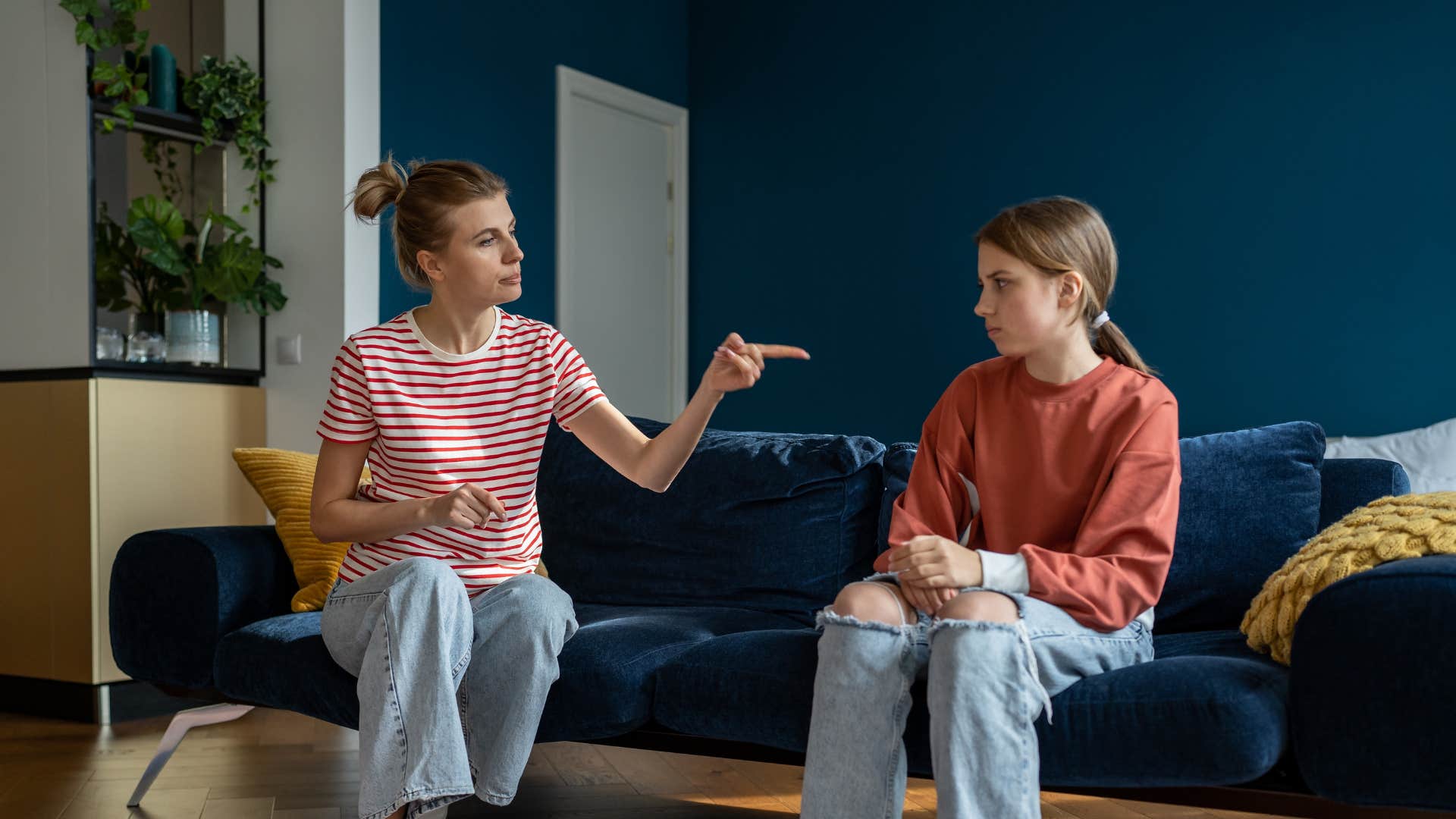11 Phrases Gen Z Will Never Use With Their Own Children
Gen Z is quickly learning what not to say when they have kids.
 Galina Kovalenko | Shutterstock
Galina Kovalenko | Shutterstock Gen Z is a completely different generation. From how they act to how they think, it's no wonder that there are phrases Gen Z will never use with their own children.
Blame it on social media or the rise of gentle parenting, but Gen Z has a completely different perspective on raising kids. For some, this difference in perspective might be refusing to hit their kids. For others, refusing to yell at their kids is another no-go in the parenting notebook. While there are different people in all generations, as it stands, Gen Z collectively has a few phrases that nine times out of ten, they won't be using anytime soon — even if the older generations disagree.
11 phrases Gen Z will never use with their own children:
1. 'Because I said so'
 AstroStar | Shutterstock
AstroStar | Shutterstock
The first phrase Gen Z will never use with their own children is "Because I said so." Almost every kid out there has heard this phrase from their parents. At school or within their homes, many parents feel that uttering this phrase means that they're somehow in the right.
However, Gen Z views parenting in a different light and, because of that, doesn't think it's efficient enough to say, "Because I said so," without further explanation. Call them 'sensitive,' but Gen Z believes that children deserve the bare minimum respect. This is why Gen Z would prefer explaining things rather than leaving things open-ended.
This is great, as children who feel respected and listened to are increasingly more likely to have close bonds with their parents. According to parent coach and psychologist Jeffrey Bernstein, Ph.D., "Listening to children helps to foster open and honest communication, which can lead to more positive relationships and a deeper understanding of their perspectives."
So, while people might criticize Gen Z for their 'soft parenting,' Gen Z will be the parents who will almost always see their kids for the holidays.
2. 'Stop crying' or 'I'll give you something to cry about'
 fizkes | Shutterstock
fizkes | Shutterstock
Hearing this phrase probably makes 90% of the population cringe or flinch. It's a tale as old as time, in which parents felt the need to threaten their kids in order to get them to comply. However, this form of parenting rarely ever worked, as it taught their children a master class on how to repress their emotions.
And while old-school parents might've thought repressing those tears made us stronger, research says otherwise. According to a study published in the Journal of Personality and Social Psychology, suppressing negative emotions removes positive ones while only leaving the negative emotions intact. As one can imagine, this form of 'coping' can have drastic consequences for someone's mental health.
This is why Gen Z will never use a phrase with their own children: "Stop crying, or I'll give you something to cry about." People might call Gen Z parents sensitive, but at the very least, their kids will feel safe enough to be vulnerable with their parents. And while dealing with those emotions isn't easy, it often leads to better parent-child bonds in the long run.
3. 'You should be grateful'
 Motortion Films | Shutterstock
Motortion Films | Shutterstock
Most people have heard this phrase once or twice from their parents. "You should be grateful" is one phrase Gen Z will never use with their own children. Now, at the moment, grandparents and family members alike might roll their eyes and say that Gen Z is overdoing it with the parenting.
After all, how can uttering this phrase truly impact kids for the worse? But it's the institution that somehow they should be grateful for the bare minimum that gets to kids. Like it or not, kids didn't ask to be put into this world, and yet, somehow, they're expected to be grateful and happy for their parents doing the bare minimum.
Not only is this a bit ridiculous, but it can also cause resentment as kids feel like their feelings aren't important to their parents. According to a study published in 2019, children who have a dismissive attachment style are increasingly more likely to have difficulties self-regulating. So, criticize Gen Z, but at least their approach to parenting doesn't end in their future children potentially resenting them.
4. 'You'll understand when you're older'
 BearFotos | Shutterstock
BearFotos | Shutterstock
There's no greater frustration than hearing an adult say, "You'll understand when you're older." While adults might like to believe that kids can't possibly understand sadness, stress, or other complicated emotions, the truth is that kids are more perceptive and intelligent than they realize.
According to psychologist Carl E Pickhardt, Ph.D., "Children observe their parents more closely, appraise their parents more carefully, and know their parents better than parents do the child." This is why a phrase Gen Z will never use with their own children is, "You'll understand when you're older." Now, sure, there are certain struggles only adults will deal with. That being said, most kids don't like to feel as if they're being underestimated, which is why most kids hate this phrase.
While they might not understand what their parents are going through, it doesn't mean they are immune to emotions or similar experiences. On top of that, many parents use this phrase to be straight up toxic towards their kids. When their kids are 'misbehaving' or 'talking back,' parents might say this phrase as if to say, 'I hope you go through this when you're older,' which, as most can imagine, doesn't translate well for most children.
So, as an alternative, a better phrase to use would be, 'Let's talk about this when you're older." That way, it's not a matter of thinking they can't understand it; instead, it's a matter of the topic being appropriate for their age group.
5. 'You're too sensitive'
 fast-stock | Shutterstock
fast-stock | Shutterstock
Unfortunately, many parents belittle their kids by accusing them of overreacting. With an eye roll and a sigh, these parents will swear that the younger generations have become too soft. However, being emotionally vulnerable isn't a weakness; vulnerability is a sign of courage.
According to lecturer and author Gregg Levoy, "Vulnerability feels like weakness when it's experienced on the inside, but looks like courage when it's viewed from the outside. When we see it in others, we're inspired." This is why a phrase Gen Z will never use with their own children is, "You're too sensitive."
Sorry to say, but crying doesn't make someone automatically sensitive. If something traumatic happened or if they're going through their first friendship breakup, grieving that person or those experiences is normal. As parents, it's important to understand these emotions, understand that this is a huge deal for kids, and find ways to be supportive. Thankfully, Gen Z understands this, causing them to approach their children with more compassion than the previous generations before them did.
6. 'You don’t have it hard'
 Motortion Films | Shutterstock
Motortion Films | Shutterstock
One phrase Gen Z will never use with their own children is, "You don't have it hard." If there's one way to cause a child to grow resentful of their parents, it's by using this phrase. Sure, parents might be frustrated or truly believe that their child's struggle is a walk in the park, but it doesn't make this phrase any less dismissive.
Even if parents don't understand their children, it's important not to make comparisons or belittle children because a parent's life is hard. After all, two things can be true at the same time: while parents might have it hard, equally, their child could also be going through a difficult transition period.
So, rather than make comparisons, Gen Z vows to push their struggles to the side and be there for their kids when they become parents. By listening and being compassionate, parents form strong bonds with their children. According to a study published in 2020, empathetic parents create empathetic children with better mental health. So, while Gen Z might be criticized for this approach, one thing is for sure: their kids will thank them.
7. 'Stop acting out'
 Brian A Jackson | Shutterstock
Brian A Jackson | Shutterstock
Listen, kids can be embarrassing at times. When parents are at the grocery store and trying to shop, it can be embarrassing to watch their child flail on the floor and scream for the whole world to hear. And in a world that's becoming less child-friendly, most people will give parents a dirty side eye rather than understand their struggle.
Still, a phrase Gen Z will never use with their own children is, "Stop acting out." As most people know, Gen Z is becoming increasingly more self-focused than previous generations. As a result, they don't care about how others perceive them compared to the older generations. As professor of psychology Jean Twenge, Phd, explained, "Younger generations are more individualistic than the Silent and Boomer generations."
That said, Gen Z cares more about their child's well-being and getting to the root cause of the issue rather than reminding their child that they're embarrassing. While it might take longer, understanding the root cause and fixing it is a lot more effective than pointing out that their child's actions are embarrassing, which ultimately does nothing to stop their child from engaging in that 'embarrassing behavior.'
8. 'Don't talk back to me'
 pixselstock | Shutterstock
pixselstock | Shutterstock
Every child has experienced this moment before. Maybe they didn't agree with their parents, or perhaps they had a question before blindly following what their parents asked. In the back of their head, kids don't see anything wrong with speaking up or voicing their concerns.
But almost always do parents respond by calling their questions or opinions 'disrespectful' and out of line. This is probably why a phrase Gen Z will never use with their own children is, "Don't talk back to me." Having an opinion doesn't make children's words disrespectful.
Like anyone else, children are curious and want to know what's happening before they get ready to go out. As licensed clinical psychologist Liz Nissim, Ph.D., explained, "A good rule of thumb is to share when your child shows interest or asks you a direct question." Even so, most parents find their line of questioning disrespectful, as in their eyes, children should be seen, not heard. Thankfully, this sentiment is changing as Gen Z slowly gets rid of the narrative that having an opinion is automatically disrespectful.
9. 'Finish your food'
 SynthEx | Shutterstock
SynthEx | Shutterstock
Sometimes, children aren't that hungry. Maybe they had a big lunch, or maybe they simply don't feel like eating a full adult-sized plate of spaghetti. Either way, it doesn't matter for old-school parents. It's unfortunate, but many parents will force their kids to finish their food, even if their kids are beyond full.
And while it may not seem like a big deal, pressuring their kids to eat more than they can handle can lead to an unhealthy relationship with food and disordered eating. According to research published on Science Direct, pressuring children to eat foods that are 'good for them' has been linked to lower fruit and vegetable intake and picky eating in children, demonstrating that forcing kids to eat doesn't always benefit them in the long run. This is why a phrase Gen Z will never use with their own children is, "Finish your food."
For many parents, this might be viewed as a waste of time. After all, their kids should be grateful that they're even eating food in the first place. However, whether or not their child finishes their food isn't always a huge deal. Nine times out of ten, they can always save it for lunch the next day, which is why most of Gen Z doesn't view it as a huge problem. As long as their kids are healthy, who cares if they have leftovers?
10. 'There are people who have it worse than you'
 Thaninee Chuensomchit | Shutterstock
Thaninee Chuensomchit | Shutterstock
Reminding a child of their privilege is a powerful guilt trip. With a stern expression, most parents will say, "There are people who have it worse than you," to justify their bad behavior as parents. Thankfully, Gen Z isn't like this, and as a result, this is a phrase Gen Z will never use with their own children.
Unlike other parents, Gen Z understands that two things can be true simultaneously. While other kids might have it worse, it doesn't erase the fact that their kids are having a hard time. So, instead of approaching it with judgment or harsh words of criticism, Gen Z parents show compassion.
They listen to their kids and do their best to sympathize with their concerns. Most importantly, they never mention this comparison and instead focus on the situation.
11. 'Whatever happens here, stays here'
 DimaBerlin | Shutterstock
DimaBerlin | Shutterstock
Finally, the last phrase Gen Z will never use with their own children is, "Whatever happens here, stays here." Firstly, it should go without saying that parents who utter this phrase rarely take their own advice. More than happy to blast their child's mistakes, they'll completely embarrass their child and tell their secrets to anyone who'd listen.
However, there's a deeper issue here that goes way beyond keeping things lowkey. While it's not nice to share personal information, there will almost always be a time when opening up is necessary. From neglect to abuse, children shouldn't be taught to keep silent about everything that goes on at home.
Thankfully, Gen Z understands this, so they focus more on creating a safe space than on reminding their children that suppressing what's going on is the 'best thing to do.'
Marielisa Reyes is a writer with a bachelor's degree in psychology who covers self-help, relationships, career, family, and astrology topics.

